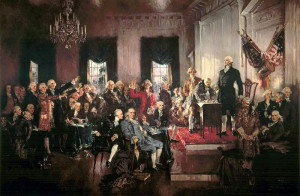Rivera Sun's Blog: From the Desk of Rivera Sun, page 33
January 15, 2015
Author Rivera Sun Spreads the Seeds of Change in Gainesville, FL
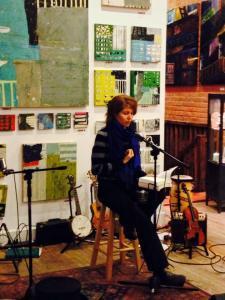
Rivera Sun at a workshop and reading on the Dandelion Insurrection and nonviolent action.
Author/Activist Rivera Sun visits Gainesville, Florida on Feb 3rd, 2015, speaking about “Love In Action For the Times We’re In” at the Civic Media Center at 7pm. Suggested donation $3-5. Cosponsored by the River Phoenix Center for Peacebuilding and RealLifeScripts.
Join Rivera Sun as she shares inspiring stories of nonviolence in action and reads from her powerful novel on nonviolence, The Dandelion Insurrection. Rivera Sun will also speak about love in action – a phrase used by Dr. Martin Luther King, Jr. and Buddhist monk and peace activist, Thich Nhat Hanh, to describe what happens when “the heart bursts open and springs into action!” Bringing you hope and courage for these times, Rivera Sun relates the personal journey of becoming love in action and describes the growing Movement of Movements that is sweeping across the nation and into our lives!
This is not your ordinary author tour. After visiting six cities in Florida, Sun will be visiting 40+ cities and towns nationwide, speaking, reading from her novels, and teaching workshops on the strategies of nonviolent action behind The Dandelion Insurrection’s story of change. Rivera Sun will be speaking on building a culture of active nonviolence, the Movement of Movements, and how to get involved with a nationwide group she works with, Campaign Nonviolence. In her lively, invigorating speaking events, Ms. Sun connects the dots between the issues we face, relates stories from historic nonviolent struggles, covers groundbreaking new understandings of nonviolent struggles, and brings a pertinent and timely message to youth, elders, students, and ordinary, extraordinary people everywhere!
Learn more about Rivera Sun’s “Seeds of Change” Tour here.
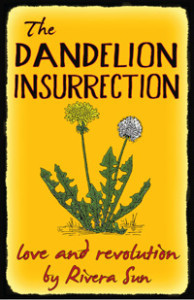 Rivera Sun is the author of The Dandelion Insurrection, Billionaire Buddha, and Steam Drills, Treadmills, and Shooting Stars, the cohost of Occupy Radio, and the cofounder of the Love-In-Action Network. She is also the social media coordinator for Campaign Nonviolence and Pace e Bene. Sun participated in the James Lawson Institute 2014 and her essays on social justice movements appear in Truthout and Popular Resistance. www.riverasun.com
Rivera Sun is the author of The Dandelion Insurrection, Billionaire Buddha, and Steam Drills, Treadmills, and Shooting Stars, the cohost of Occupy Radio, and the cofounder of the Love-In-Action Network. She is also the social media coordinator for Campaign Nonviolence and Pace e Bene. Sun participated in the James Lawson Institute 2014 and her essays on social justice movements appear in Truthout and Popular Resistance. www.riverasun.com
Spring 2015 Seeds of Change Tour Dates and Locations
Florida Tour Jan 29-Feb 7th, 2015
St. Petersburg, FL Jan 29th USF
Tampa, FL Jan 30th 7-9pm Reading Sacred Grounds; Jan 31st 1-5pm Sacred Grounds “Creative Nonviolence Workshop”
Sarasota, FL Feb 1-2nd Sarasota Peace and Justice Education Center, Season of Nonviolence
Gainesville, FL Feb 3rd Civic Media Center, sponsored by River Phoenix Center for Peacebuilding & RealLifeScripts
Orlando, FL Feb 4-5th Feb 4th, 7-9pm “Seeds of Change” Workshop at the Callahan Center; Feb 5th TBA
Coconut Creek, FL Feb 6th (times/locations TBA)
Coral Springs, FL Feb 7th, participating in the Silent Peace Walk
Miami, FL Feb 7th (times/locations TBA)
West Coast Tour March-April 2015
San Diego, CA
Santa Cruz, CA
Petaluma, CA March 22-24th
Ukiah, CA March 26-28th
Mendocino, CA March 29th
Chico, CA
March 30th or April 1st
Mt. Shasta, CA
Eugene, OR
Leavenworth, WA
Seattle, WA
Portland, OR April 18th
Rocky Mountain Tour Late-April 2015
Boise, ID April 21st
Cheyenne, WY
Boulder, CO
Denver, CO
Crestone, CO
Taos, NM
Jan 24th, Spring date TBA
Santa Fe, NM
Madrid, NM
East Coast Tour May-June 2015
Austin, TX
May 9th
Houston, TX
May 10th & 11th
Fayetteville, AR
Washington, DC
Woodstock, NY
Westchester, NY
New York, NY
Concord, MA
Fryeberg, Maine
Great Lakes Region
Chicago, IL
Madison, WI
Penokee Hills, WI (tentative)
Newaygo, MI (tentative)
Storm Lake, IA (tentative)
December 31, 2014
Rivera Sun – New Year’s Resolutions

The Earthship on the Taos Mesa in the Snow
This year, I’m making resolutions. I rarely do, but 2015 seems to be throwing the mantle down at my feet. It’s time to organize, mobilize, and strengthen ourselves and our communities for a time of immense change. 2014 showed us what flexing our people-power might look like. Imagine if 11 million Americans were getting active in their communities as we work for peace, economic justice, and environmental sanity!
Here’s my New Year’s Resolutions 2015. They’re fairly modest, but check out what’s coming in 2015 beyond them.
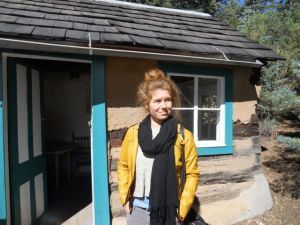 To host a Campaign Nonviolence March in my community during the Campaign Nonviolence Week of Actions Sept 20-27th, 2015 Oh, you want to resolve to do this, too? What fun! Here’s how.
To host a Campaign Nonviolence March in my community during the Campaign Nonviolence Week of Actions Sept 20-27th, 2015 Oh, you want to resolve to do this, too? What fun! Here’s how.
To share my favorite vegan recipes with anyone who watches Cowspiracy and decides the planet is more important than their meat-eating habit. I’ve been a vegan for close to ten years – I have great recipes!
To “be kind, be connected, and be unafraid!” – as we say in The Dandelion Insurrection.
To nurture and nourish my body and soul along with the Movement of Movements.
To plant at least some lettuce in my garden this summer, if not a whole lot more!
And, yes, help build the growing Movement of Movements for social change! Viva!
Aside from those resolutions, here’s some exciting aspects of 2015:

Artwork by Grace Silvermoon after reading The Dandelion Insurrection.
The Dandelion Insurrection Study Guide to Nonviolent Struggle will be out Jan 15th. Hooray!
My new novel, Billionaire Buddha will be released at the end of February. Three cheers!
I’ll be visiting 40+ cities and towns speaking, reading from The Dandelion Insurrection, and teaching workshops on strategic nonviolent action. Curious where I’m going? Here’s more info!
The Campaign Nonviolence National Conference will be held in my backyard, practically. So, come visit me in New Mexico! The conference is Aug 6-9th in Santa Fe and some of my heroes are coming to speak: Rev. James Lawson, Erica Chenoweth, Kathy Kelly, Medea Benjamin, Ken Butigan, and John Dear. More info here.
I wish you all a very merry New Year’s Eve and an incredible 2015! May we all be courageous, bold, and find strength and support from one another!
All my love, Rivera
December 16, 2014
“I’ve got sweaters … what I need is social change.” – Rivera Sun

Rivera Sun harvesting potatoes in New Mexico.
One year, my relatives gave me a cow for Christmas … not a real cow – a Project Heifer Cow. As a kid, I’ll admit to scratching my head over that one, but, now that I’m an adult who has outgrown pink foot pajamas, dolls, and toys, gifts for social change make me really excited! I don’t need another “thing” to collect dust or a gift card to corporation I’d boycott because they don’t pay living wages.
All I want for Christmas is support for the Movement of Movements.
These are the people who train our friends and neighbors in nonviolent action. They stop environmental destruction, work for living wages, halt wars, protect Net Neutrality, stand up to police violence, combat propaganda with truth, and thwart unjust trade deals . . . in other words, they’re on the front lines of life and death, working on your behalf every single day.
If you’d like to give me something for Christmas, make a donation to one of these amazing groups. Here are my picks for organizations and endeavors to support. If you’d like donate as a gift to me (or the world) this season, I’d appreciate that more than a card or a hand knitted sweater. (I’ve got sweaters, what I need is social change.)
Campaign Nonviolence: building a culture of active nonviolence to end war, poverty, and the climate crisis. This incredible group mobilized people in all 50 states to partake in 250 actions Sept 21-27th. In 2015, they will mobilize for 1,000 nonviolent actions to end all forms of violence and build a culture of peace. (I do their social media and outreach work. Thanks for helping with my modest salary. You’re underwriting my novels.) Donate.
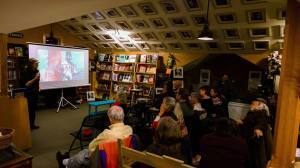
Rivera Sun presenting a film screening at Moby Dickens Bookshop
Moby Dickens Bookshop: did you want to send my novels to someone? Support the evolution of Taos’ local bookstore into a community hub that will be screening my social justice film picks this winter, among other amazing community events! Back a Bookshop!
Popular Resistance: the most remarkable source of citizen journalism covering the efforts and actions of ordinary, extraordinary people in the Movement of Movements. They are gearing up to mobilize the nation. Your support now is perfectly timed! Mobilize Change.
Metta Center for Nonviolence: the most heartfelt, soulful, in-depth source of nonviolence training I have ever run across. Highly active in the Bay Area, they also have a weekly radio show (Peace Paradigm Radio), and conduct workshops all over the country. They run the whole operation out of a barn. I’ve slept on their floor, beneath the photo of Gandhi and a spinning wheel. Support Today’s Gandhis!
Truthout: excellent investigative journalism in an era of lies, propaganda, and sound bytes. They also, btw, publish your favorite red-head’s opinions. Amplify the Message.
World Beyond War: if you believe it, it will come. The abolition of war may sound farfetched … but the journey of a 1,000 miles begins in a single step. At one time, abolishing slavery seemed impossible. Believe.
 Thank you all for your generosity … and all forms of that generosity from volunteering in your community to fundraising through bake sales to film screenings to participation in marches to those interminable meetings. It’s all a part of the Movement of Movements!
Thank you all for your generosity … and all forms of that generosity from volunteering in your community to fundraising through bake sales to film screenings to participation in marches to those interminable meetings. It’s all a part of the Movement of Movements!
Now, I’m off to mail Dandelion Insurrection books out to lucky holiday gift-givers.
With love and gratitude,
Rivera Sun
December 3, 2014
Cuts To The Heart: Schenwar’s Book On Mass Incarceration
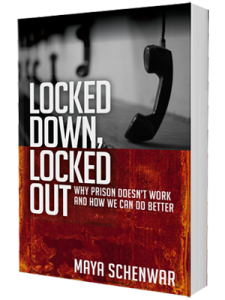
Locked Down, Locked Out is a must-read!
Locked Down, Locked Out, Truthout Editor-in-Chief Maya Schenwar’s nonfiction book on mass incarceration arrived in the mail last week. I opened the first page and did not stop reading until the very last word. From the moment my eyes made contact with Schenwar’s gripping confession of her complex relationship with her often-incarcerated sister, I was magnetized by the writing.
To say, “I recommend this book,” is an understatement. I think every lawyer, lawmaker, judge, police officer, corrections officer, and private prison company owner and shareholder should be required to read this book. As I said in my review, Schenwar “cuts us open with the scalpel of this book, hoping to find our humanity alive.”
Two years ago, I wrote my first social protest novel, Steam Drills, a story about coal and climate change . . . and prisons. With 2.5 million Americans currently incarcerated, prison runs like an undercurrent through the psyche of our nation. Some socio-economic classes can ignore the impacts of our mass incarceration policies, but for others, the vicious cycle of lack of opportunities and imprisonment leaves deep scars upon their families and communities. As Maya Schenwar mentioned on our Occupy Radio interview, the modern American criminal justice system is “racist to the core”.

Listen to Maya Schenwar on Occupy Radio
From racial profiling to higher conviction rates to longer sentences to cycles of recidivism and the impacts on the children of incarcerated parents, the criminal justice system plays out like a recurring nightmare of our nation’s long history of enslaving, persecuting, and criminalizing non-whites . . . and profiting off of the process. In my novel, Steam Drills, the ghost of John Henry haunts a coal company lawyer. The legend and ballad of this American near-mythic figure frames John Henry’s story as “man versus the machine” – a tale of human spirit during an era of modernization and mechanization. Yet, in researching the historic John Henry, I learned the uncomfortable truth: many historians believe the real John Henry had been imprisoned and forced to work on a chain gang – one of the thousands of African Americans who lost the newly gained freedom from slavery to the racist persecution that would snatch them off the streets and throw them back into shackles to supply cheap labor for the state.
That was over 150 years ago, and the story is still repeating on the concrete sidewalks of cities and towns across the United States: people of color are being swept into prisons. The statistics are staggering and the stories are heart-wrenching.
“Dates and facts on slips of paper couldn’t explain as much as a single story.” – Steam Drills.
In covering the societal and emotional impacts and human costs of our mass incarceration policies, Maya Schenwar’s book relentlessly pursues the kind of truth that doesn’t fit on charts. She reveals our humanity through her stories of human beings impacted by policies that break spirits and fracture families. The emotions, stories, and situations I wrote about in the fictional Steam Drills find their factual counterparts in Schenwar’s Locked Down, Locked Out. Reading both books together may split your heart into pieces . . . and help you understand a current oppression that’s tearing our nation apart.
Listen to Rivera Sun’s interview with Maya Schenwar on Occupy Radio.
Rivera Sun is the author of The Dandelion Insurrection, and Steam Drills, Treadmills, and Shooting Stars, the cohost of Occupy Radio, and the cofounder of the Love-In-Action Network. She is also the social media coordinator for Campaign Nonviolence and Pace e Bene. Sun’s essays on social justice and nonviolent movements have appeared in many journals, including Truthout and Popular Resistance. www.riverasun.com
October 22, 2014
Upcoming Adventures in the Works …
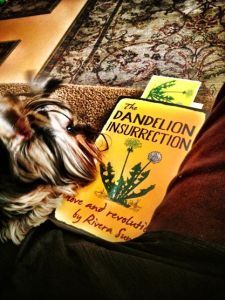
Luigi studies The Dandelion Insurrection. Thanks to Carol Ranellone of Taos, NM.
Workshops, speaking tours, and The Dandelion Insurrection Study Guide . . . it is an exciting time as several long-anticipated projects begin to emerge into the world. Rivera Sun is scheduling a West Coast, East Coast, and Rocky Mountain Tour for Spring 2015. While the snow starts to fly in many parts of the United States, hundreds of groups may be reading and discussing the Dandelion Insurrection Study Guide and learning how to make change through nonviolent action. Gather your friends, neighbors, aunties, elders, youth, and any ordinary, extraordinary person who is curious about how to make change in this world. Details will be coming out soon about the tours and workshops. The study guide will be released sometime in November. Contact us if you’re excited to schedule a workshop, study group, or speaking engagement. Contact us here. Thank you!
September 14, 2014
Autumn’s Wisdom & Movements For Change

Rivera Sun harvesting potatoes in New Mexico.
Here at the foot of the Sangre de Christo Mountains, the desert is promising winter. The sagebrush mesa is dotted yellow with autumn flowering shrubs. Soon, the aspens high on the sides of the peaks will turn shocking gold with the bite of cold air. Our field of winter squash ripens orange, red, and yellow. The late season corn is thickening.
I have always been a rural American. Even during my sojourns in mid-sized cities, I sought out the ocean and the redwoods, the local farms and markets. My youth was spent among pine trees and fields of snow, barrels of potatoes and baskets of fresh-picked raspberries. Today, I find myself pondering social movements in terms of evolutions of forests from meadowlands or the emergence of spring wildflowers from the snowy ground. We are growing change . . . planting seeds and cultivating fields of possibilities. For many of our efforts, harvest is a long way off. We have planted orchards of hope from which we may never taste the fruit, yet we persevere in tending the sapling trees, believing in the promise of sweetness for the generations yet to come.
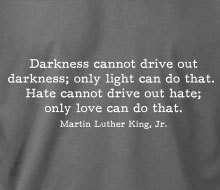
Dr. Martin Luther King, Jr.
Violence and destruction has proven to be a terrible farming practice . . . and an even worse approach to resolving our political and social problems. Yet, in so many spheres of our lives, violence has been normalized. From prisons to police to systemic poverty to environmental destruction to unending war to movies, books, and music, our culture is addicted to violence. And, just as an alcoholic thinks that one more drink might ease the very pain caused by alcoholism, so does our culture believe that more violence will end the agony of our abusive cycles.
“Darkness cannot drive out darkness; only light can do that. Hate cannot drive out hate; only love can do that.” – Martin Luther King
Even within our movements towards social and political change, the culture of violence poisons us. We are plagued with the continuous debate around the “diversity of tactics” and demands from violent flanks to engage in property destruction or physical harm of our “opponents”. Where is the courage to believe that our world – and our social movements – can liberate themselves from the perversions of violence and destruction? Aside even from these discussions, our efforts are often steeped in the emotional violence of fear and anger. At times, the rhetoric of outreach efforts boils down to the fear-provoking question, what will happen if we don’t take action to stop this problem?!
Today, I invite us all to consider the visionary question, what might happen if we do take action?
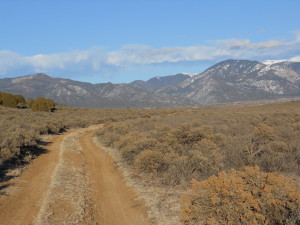
The Sangre de Christo Mountains near Rivera Sun’s home outside Taos, New Mexico.
In the spring, when I prepare a field and plant seeds, I am not thinking of starvation or disaster. My mind exalts in the resplendent vision of the harvest! Each seed contains the image of the shared table of neighbors, friends, and all my human family. I plant for the smile on a child’s face and the delighted sigh of old women. I plant for the aroma of soup and herbs rising from the stewpot on a cold winter’s night. I plant for these times, and for the vision of humanity’s future. These are the images that call me to the field to labor and sweat. I bend my back to cultivation because I believe in the beauty of tomorrow. In our movements for change, let us sing the praises of the world we are striving towards! Let us loose the tongues of courage, those that dare to herald the dawning future on our horizon. Let us not be harbingers of the apocalypse, nor soothsayers of gloom and doom. Let us be the trumpeters of humanity’s highest aspirations! Let us be the prophets of a better world!
Sing to me of your emboldened, audacious vision and I will strive for it! I will come to meetings, take to the streets, confront the dying systems of destruction and ask them to stand aside. I will clear the way for the new world coming. I will swear loyalty to the ever-lasting ideals of humankind: honesty, truth, justice, equality, compassion, courage, peace, opportunity, and life!

Squashes and flowers grown in the garden.
There are seasons to our efforts. We can feel the changes on the air. Here, on this desert mesa where I live, the hints of winter have arrived. The daylight shortens by the hour. The time of reflection nears. Soon, we will gather in the fields and harvest the squash, corn, basil, and beans. We will store up the fruits of the summer’s laboring and savor them as the cold creeps across the land.
When the time comes, gather in all your experiments in this laboratory called Life. Gather in everything you have experienced and tried this year. Ponder these lessons and grow from them. Nourish your body, mind, heart and soul. The summer has been glorious, full of adventures and unfoldings, but the time approaches to contemplate, reconsider, and prepare to emerge again. As you take a moment to examine deeply, I encourage you to peer into the assumptions of violence our culture tends to make. Consider the alternatives. Dare to articulate another vision. Time is ever turning, and it will not be long before we need your voice. Already, our hearts long to hear the anthem of our future . . . will you dare to sing it?
July 27, 2014
Cultivating vegetables and democracy – a letter from Rivera Sun
Dear Friends,

Rivera Sun at home in the earthship house. Photo by Nova Ami
Certain things fall by the wayside while the squash and weeds proliferate and our US tax dollars go to work bombing children in foreign countries. Updating my website and sending out newsletters lose significance as the power mongers maneuver for a stronger stranglehold on our lives. Yet, the crises grow into constants, and I move from weeds to harlequin bugs to flea beetles to the army of ants currently invading the chimney of the Earthship here in New Mexico. With a twinge of conscience over my garden and household genocides, I attend demonstrations against violence and war, and take part in organizing calls to address the abysmal state of democracy in the United States.
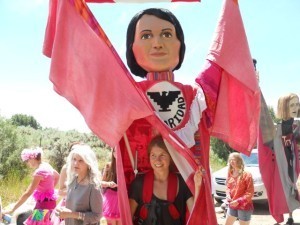
Rivera Sun carrying the giant Dolores Huerta puppet. Photo by Dariel Garner
In the mornings, before the world stirs crazily, I meditate and write. After months of scrawling my pencil across the reused drafts of The Dandelion Insurrection, a six inch stack of words pulses beside me . . . the next novel is growing as surely as the round green squashes. I have many of you to thank for this miracle of our interconnection. Your words, online posts, articles, and comments have all nurtured this novel with insight and creativity. The story tackles some serious socio-political issues, such as income inequality, extreme wealth in times of widespread poverty, the history of conquest . . . and in case that wasn’t enough, the novel also explores the nature of reality and our relationship to it.
I will leave you licking your lips in anticipation . . . the novel will come in the fall, toward the end of the harvest season, just in time for the snowfalls and winter rains, fires, warm quilts, and short daylight hours.
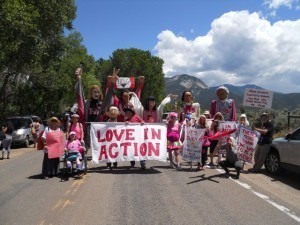
“Most Patriotic” in the 4th of July Parade. Photo by Dariel Garner
Writing is interspersed with our Love-In-Action Network adventures. Last year, a trio of us formed a set of locally organized, autonomous, interconnected, nonviolent struggle study and action groups. It’s quite a mouthful to describe friends sitting in a circle with cookies, tea, Gene Sharp’s writings, and the lyrics to the old protest songs. It seems mundane, yet our local Taos Love-In-Action group has organized over thirty events since March, and has six more planned before the end of September.
Gandhi used to call his endeavors experiments in truth. Love-In-Action is an experiment in self-organizing. Generally, activists organize around a single issue. Love-In-Action organizes around studying nonviolent action. We participate in parades, vigils, demonstrations, public comments, protests, etc. as a way of putting our study into practice. Love-In-Action members voluntarily join into actions they support, and if they don’t support that issue, they turn their attention and energies elsewhere. With the recent attacks on Palestine, some members organized peace vigils while others refrained from participating. In theory (though we have never tested it yet), Love-In-Action Taos could stage a peace protest and a counter-protest on the same issue.
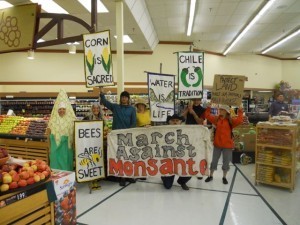
Love-In-Action Taos during March Against Monsanto May 2014. Photo by Dariel Garner
This model is not just practical (though we have avoided long arguments over what issues to endorse or condemn), it is also a living model of a democratic society. Citizens are empowered with the tools of nonviolent action, and they also learn respect for diverse community along with the practices of discourse, dialogue, and listening that are so essential for functional democracy. Each of us discovers how to work with one another on common ground while respectfully disagreeing on other issues.
The Taos Love-In-Action group began with literal common ground: local agriculture. In listing the enormous set of problems our society (both national and local) faces, we came to the understanding that local agriculture sits in the center of creating a stronger local community, protecting water rights, ending hunger, easing poverty, and maintaining food security in a high desert region. Three quarters of our group is actively cultivating vegetables – everything from a porch garden to a one-acre plot in a traditional farming valley. Field reports during our Monday night Love-In-Action gatherings literally cover the state of the kale and the most recent public demonstration.
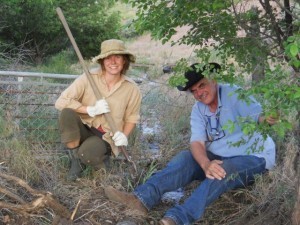
Peter Harris and Rivera Sun listen to the sound of the acequia (irrigation ditch). Photo by Dariel Garner
I invite you to form a local Love-In-Action group with your friends, family, or neighbors. As many of you know, I grew up in a farming family. If we are to grow anything – potatoes or democracy – we must tend our soil and plant the seeds of change. Nonviolent action has proven to be a democratizing force, taking power from elites and dispersing it amongst the people. As you can see from the photos, our experiment in self-organizing has been rewarding, colorful, and joyful. Each gathering or action has been infused with great creativity and generosity of spirit . . . in a manner that has been very reminiscent of The Dandelion Insurrection.
With that, I bid you adieu. The lettuce is threatening to bolt faster than the rabbit I chased out last night.
With love,
Rivera
May 30, 2014
Oligarchy: As American As Poisoned Apple Pie
The current struggle between democracy and oligarchy in the United States traces its roots back to the 1787 Philadelphia Convention where the wealthy elite pulled off a counter-revolutionary coup to stifle democracy.
Oligarchs are as American as poisoned apple pie. Their wealth and power look mouth-wateringly good, but with every bite, democracy dies.
” . . . in so far as we make (the use of wealth in politics) hard, we are advancing the agenda of democracy and we are decreasing the power of oligarchs,” said Jeffrey Winters, author of Oligarchy and professor of politics at Northwestern University on a recent episode of Occupy Radio.
American oligarchs – wealthy elites who use money to buy power – have been around so long they’re almost as traditional as apple pie. They co-opted a people’s revolution, gave themselves vast acres of land in the newly formed nation, and then pulled off a coup in 1787 that is commonly referred to as the US Constitution.
In the 1770-80′s something revolutionary was stirring in the colonies. It wasn’t a war. It was a people’s movement called democracy. In public meetings and town halls, ordinary citizens were gathering to discuss how to govern themselves. In the Journal of American History, Joyce Appleby wrote:
“Foreign visitors in the 18th century invariably commented on the vitality of public discussions and on the political confidence of ordinary men.”
Although these ordinary men did not include African-Americans, women, or the indigenous tribes, these assemblies were not as divided by wealth and class as were the aristocratic governments of Europe. This gave rise to a culture that was virtually unknown at the time: that of commoners sharing the responsibility of self-governing.
Yet, after the war, the revolutionary notion of democracy produced a counter-revolution. Oligarchs of that era found it difficult to conduct business among the thirteen sovereign states, each of which was developing its own laws regulating commerce, taxes and tariffs. The first constitution of the United States (the Articles of Confederation 1778) endured for ten years before the oligarchs could find a way around it. Even then, they had to resort to extraordinary means.
In February 1787, George Washington (the richest man in the United States) proposed a convention in May in Philadelphia for the alleged purposes of revising the Articles of Confederation. Upon arrival, however, delegates to the Philadelphia Convention were dismayed to discover that Washington, Madison, Hamilton and others wanted to throw out the old Articles of Confederation. In their place, Hamilton proposed a new, second Constitution of the United States, which included a powerful federal government to rule over the state governments, a president for life, a senate appointed for life, an Electoral College that elects the president, and an appointed for life Supreme Court with authority over the state courts.
“Nothing but a permanent body can check the imprudence of democracy,” Alexander Hamilton is quoted as saying according to the Notes of the Secret Debates of the Federal Convention of 1787 taken by Robert Yates.
Many of the delegates left in protest. Of the sixty-two delegates appointed, only thirty-nine signed the new Constitution. The Philadelphia Convention, widely heralded today as the birthplace of democracy, was nothing short of an oligarchic coup. Terms for elected officials were a minor concession to the proponents of democracy. The Bill of Rights was tacked on at the insistence of outraged citizens during the process of ratification, but it narrowed the list of protected rights to ten out of the dozens that were initially proposed.
Today, tourists can visit the sunny, open rooms of Liberty Hall, but in 1787, the Convention took place under strict secrecy. The doors were closed, the windows blacked out, and security guards ringed the building. In Madison’s Notes on the Federal Convention, the rules stated, “That nothing spoken in the House be printed or otherwise published or communicated.” James Madison, one of the main recorders, refused to publish his notes until all of the framers were buried in the grave.
If the citizens had known what was transpiring in Philadelphia, an uprising reminiscent of the Battle of Seattle at the 1999 World Trade Organization protests might have ensued. In 1787, citizens of the thirteen sovereign states considered the United States of America to be a description of a friendly alliance of nation-states similar to the United Nations. Under the new Constitution, however, the federal government of the United States of America became a new, powerful legal body that wielded supreme authority over the subordinate states.
When they found out, citizens of the day were not amused. Resistance to the new constitution was widespread. In 1787 Washington wrote, “Commotions of this sort, like snow-balls, gather strength as they roll, if there is no opposition in the way to divide and crumble them.” To ensure the states’ ratification of the new constitution, his colleagues Madison and Hamilton rolled out their propaganda machines.
William Grayson of Virginia wrote, “We are now told … that we shall have wars and rumors of wars, that every calamity is to attend us, and that we shall be ruined and disunited forever, unless we adopt this constitution…. and the Carolinians, from the South (mounted on alligators, I presume) are to come and destroy our cornfields, and eat up our little children! … These, sir are the mighty dangers which await us if we reject — dangers which are merely imaginary, and ludicrous in the extreme!”
Ultimately, the adoption of the new constitution came down to money. Like so many of our contemporary issues, the nation divided not down left-right lines, but by moneyed interests (which supported the new Federal government) and popular dissent (which objected to the loss of local power and the rising supremacy of the oligarchs). The Anti-Federalists were out-powered by the media apparatus and political influence of the oligarchs, who convinced commercial interests, small landowners, farmers, merchants and artisans to side with them. After the states ratified the new constitution, the proponents of the new system embarked on a long-term effort to alter or recreate the state constitutions and legislative structure to reflect the federal government.
Know your history, goes the stern warning. Without knowledge of the past, tyranny in the present continues to oppress us all. To better understand what transpired at Liberty Hall in 1787, imagine that a group of wealthy businessmen came together in secret to draft up a new set of laws and to create a new court system that has authority over the nations of Japan, Australia, Korea, Vietnam, Canada, the United States, and more. Then these wealthy elites empower themselves to regulate commerce to their own advantage.
If this sounds uncomfortably familiar, it’s because the modern-day Trans-Pacific Partnership Agreement has engaged in many of the same maneuvers as the 1787 Philadelphia Convention that established the US Constitution. The Trans-Pacific Partnership Agreement (TPP) is a trade deal that is being negotiated in secret. The legislators of the affected nations are not involved – just as the delegates to the Continental Congress were not present at the Philadelphia Convention. The tribunal courts of the proposed TPP would usurp the authority of the courts of the nations, just as the Supreme Court usurped the state courts. Under the TPP, commerce falls under the jurisdiction of the trade agreement board, rather than the individual nation-states. Local laws that violate the TPP would be considered void, just as the state laws were nullified if they conflicted with the new, powerful federal government. Just as the TPP was initially being fast-tracked through Congress, so did the framers of the Constitution attempt to ram it through state ratification.
Echoes of the past can be heard in the problems of the present. The revolutionary notion of democracy was put on hiatus in 1787 and the coup of the oligarchs continues to this day. Rule of the oligarchs under the empty rhetoric of democracy is so familiar and comfortable that to have millionaires in Congress and a ruling class of wealthy elite seems as American as apple pie . . . but the poisonous politics of wealth are not the homegrown democracy that was cultivated in the backyards of local communities. They are a tainted substitute peddled by wealthy elites.
Today, oligarchic rule stands poised to kill equality, justice, and ordinary citizens. Our grandmothers, all unwittingly, crisscrossed the crust, brushed it with oil, and baked it until it was golden. The sweet scent of liberty emits from such well-intentioned efforts, but watch out! Our forks are loaded with false democracy and poisonous apples sold by the oligarchs.
The question is . . . are you going to eat it?
Author/Actress Rivera Sun is a co-founder of the Love-In-Action Network, a co-host on Occupy Radio, and the author of two novels, The Dandelion Insurrection and Steam Drills, Treadmills, and Shooting Stars. www.riverasun.com
Rich People Rule: Struggle Lies Ahead
Occupy Radio cohosts Rivera Sun and David Geitgey Sierralupe interviewed Ben Page, coauthor of the new study on how politicians ignore the people. Listen here.
If a dictator moved into the White House and condemned the populace into servitude, the US political situation might be a lot clearer. But beneath the lies, false campaign promises and empty rhetoric, this is, in effect, exactly what is going on.
“Rich People Rule,” the Washington Post proclaimed on April 8, 2014, when the Gilens-Page study made headlines by confirming everyone’s suspicions that the elected officials don’t give a damn about government of the people, by the people, and for the people.
In the study “Testing Theories of American Politics: Elites, Interest Groups, and Average Citizens,” Princeton researcher Martin Gilens and Northwestern University professor Benjamin Page spanned twenty years of Republican and Democratic Congresses and Presidents, studying nearly 1,800 issues between 1981-2002. The results were startling. Politicians don’t represent the average citizen, the study finds. They represent business interests and wealthy elites. Elected officials will not give the common citizen what he or she wants – not by petitions, phone calls, emails, letters, faxes, protests, marches, or letters to the editor. Unless the moneyed interests happen to align with the public, politicians always voted against the interests of the citizens.
The implications of the study have only been compounded in the last decade. Since 2008, income inequality has skyrocketed, widening the gap between the rich and the poor. Meanwhile, the 2010 Citizens United decision along with the recent McCutcheon ruling opened the door to the political influence of moneyed interests. Due to these factors, the rich are enjoying unprecedented access to political control. Monsanto pours millions into anti-GMO labeling advertisements. The Koch brothers fund climate-denial “studies”. The Walton family makes more than the entire bottom 40% of the populace and tells their employees to apply for welfare. Billions are spent on the presidential elections, making the fundraising efforts of ordinary citizens seem pitiful in comparison. Bake sales, car washes, and Kickstarter campaigns don’t even add up to what corporations spend on a single politician. The average citizen doesn’t have the same buying power as wealthy elites and business interests. With nearly fifty percent of the populace struggling at or below international standards of poverty, the odds are stacked heavily against citizens’ movements.
This has profound ramifications for American citizens – and even more serious impacts for activists. Keystone XL protesters, Trans-Pacific Partnership objectors, and fracking opponents take note: either social movements are going to need a lot of money to buy officials . . . or activists are going to have to wage struggle where it counts.
If citizens want to see government of the people, by the people, and for the people, they’ll need to fight smarter, not just harder. The pervasive idea that “if we just shout loud enough, the politicians will hear us” has been thoroughly disproven by the Gilens-Page study. It did not matter if activists collected 100 or 100,000 signatures. Politicians did not respond to petition politics and symbolic demonstrations.

Photo by http://www.401kcalculator.org
In addition to demonstrating incontrovertibly that we, the people, are not the constituents of the elected officials, the Gilens-Page study also shows that politicians serve the business sector and wealthy individuals remarkably well – which is why the rich and powerful fund campaigns, throw money into advertisements, buy up voting machines, and hire lobbyists.
While the Gilens-Page study is evoking cries of “democracy is dead”, it is important to note that United States democracy was aborted in 1789 when the government was organized as a representational republic. In this system, representatives were elected by the white, propertied males who made up 6% of the population. State legislators appointed senators until 1913. Contrasted to popular, direct democracy in which every citizen regardless of race, class, or age votes directly on the issues, the representational republic of the United States was – and still is – an anemic substitute for real democracy.
Nor can this representational republic be called a broken system. United States government works exactly as it was designed, keeping ordinary citizens disempowered while pandering to the wealthy elite. Without a powerful citizens’ movement rooted in effective methods of nonviolent struggle, voting the current politicians out of power is not likely to resolve the situation. Currently, there is no indication that the next crop on Capitol Hill will behave any differently than the last. The Gilens-Page study empirically proves that both Democrats and Republicans behave exactly the same in regards to prioritizing the concerns of the rich.
If citizens wish to see their will manifested in this system of government, they will need to move beyond symbolic actions such as petitions and protests, and engage in effective economic, political, and social sanctioning actions against politicians, corporations, and wealthy elites.
Citizens must learn to attack politicians, corporations, and wealthy individuals in response to legislation they oppose. Nonviolent economic sanctions can be applied to these groups by boycotting their companies and products, disrupting shareholder meetings, waging effective campaigns via social media to effect price drops in their stocks, pushing divestment campaigns, and impacting the operational costs of their businesses.
Simultaneously, citizens can learn to define “legitimate government” as that which enacts the will of the people. By this definition, an elite-controlled government can be viewed by the citizens as “illegitimate”. By refusing to cooperate, acknowledge, or consent to unjust laws, the people can deny officials legitimacy when they act against the will of the people. Nonviolent sit-ins and assemblies can shut down public offices and demand resignations. Citizens can non-cooperate and refuse necessary services, skills, knowledge, or assistance to public officials and offices that act against the interests of the people. Eligible voters can, of course, vote a politician out of office, but they can also boycott an election that is rigged by the unfair influence of big money, thereby depriving the winners of the election the “mandate of the people”.
Additionally, citizens can engage in acts of civil disobedience to unjust laws. State and local nullification of objectionable legislation can erode the validity of a law – and the authority of lawmakers – by making it unenforceable among the citizens. Police can be excused from enforcing the objectionable laws by local city councils and county commissioners. Likewise, nonviolent action by citizens can be fully protected at the local level.
These types of nonviolent sanctions can be applied effectively and with powerful precision. When used correctly, strikes, boycotts, divestments, non-cooperation, and civil disobedience restore the system of checks and balances by putting social and political power into the hands of the people.
For the citizens engaged in the broad-spectrum struggles for social, economic, political and environmental justice that is becoming known as the Movement of Movements, the Gilens-Page study provides refreshing proof of the suspicions of many people: the political system serves the elite. More effective, powerful forms of nonviolent action are necessary to address the combined crises of political corruption, wealth inequality, corporate domination, economic depression, and climate change. With this clarity about the political system, citizens can apply their efforts more effectively, teaching movements for social change, politicians and the nation that citizens can demand change . . . and get it!
This article was originally published in Truthout.org. Reprinted with permission.
Author/Actress Rivera Sun is a co-founder of the Love-In-Action Network, a co-host on Occupy Radio, and the author of two novels, The Dandelion Insurrection and Steam Drills, Treadmills, and Shooting Stars. www.riverasun.com
April 22, 2014
The Changing Face of Labor
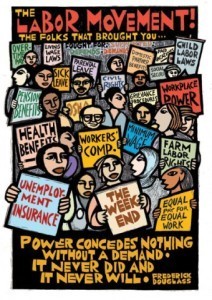
Labor Movement Poster
by Rivera Sun
Depending on one’s proximity to wage and workplace issues, the term Labor Movement may conjure up images of 19th century Wobblies with rolled-up shirtsleeves, Detroit autoworkers, or Walmart strikers. The face of labor evolves through the decades and with each change in the workplace, our identity as a populace of laborers has shifted.
Richard Monje, Vice President of Workers United/SEIU, explained on Occupy Radio (listen here) that with the steady outsourcing of manufacturing jobs overseas, labor in the United States features a higher percentage of service jobs and traditionally white-collar jobs that now receive blue-collar level wages. Pen-pushing and paper-shuffling ain’t what it used to be, especially as the cost of living rises above the scope of the average salary. No matter the amount, a vast number of Americans are living from one paycheck to another. Loan repayments and credit card interest are considered regular monthly expenses for the bulk of the populace.
Richard spoke about the low membership rates of the labor unions, proposing that the decline is as much related to an identity crisis as it is to the concessions union leaders have been forced to make on wages, health benefits, and workplace conditions in order to keep some jobs in the US. While issues such as union leader corruption, co-option of movements, and challenging political environments have also contributed to falling membership rates, self-identity may be the reason many American workers do not belong to unions.
“Labor is work,” Richard says, but to a public that identifies primarily as middle-class consumers, laborers are those that earn wages by the sweat of their brows . . . which rules out many service industry workers. Sweat is a thing of the past, as are muscles formed in the workplace, not at the gym. Ask the average corporate officer worker about the labor movement, and he may look at you strangely before pulling out his iPhone to Google labor movement as he hops on the train to the suburbs to pick up his car at the commuter station.
But he is a laborer, as is the burger flipper, the shelf stocker, the landscaper, the bank teller, the checkout clerk, the school teacher, the phone company employee in customer service, the street vendor, the local organic farmer, the barista, the solar panel installer, the biology intern collecting samples in the field, the river rafting guide, and the truck driver. The face of labor is changing. The types of work have shifted, but as a people, we are still workers. Very few of us are men or women of leisure, trust-funders, or even stay-at-home moms.
This case of mistaken identity is not really an error; it is a carefully cultivated, advertised, and marketed switch. As laborers we provide goods. As consumers we spend money. It is an important distinction. Consumers shop. Laborers strike. It is essential to the profits of the wealthy that people continue to identify as consumers.
Mass media and entertainment churn out stories that reinforce the worship of wealth. In 2013, the sixth film version of The Great Gatsby was produced. The book topped the bestseller list. Oprah.com helped drive millions of Americans to read the classic, watch the movie, and discuss the foibles of the rich. The website referred to the movie as a ” . . . thoughtful, inspiring story to help you succeed.” But what did the American people learn from the story of self-involved, wealthy narcissists who trample hearts, ruin lives, and run people over without a backward glance? We learned that the wealthy are beautiful, fascinating, tragic, and careless. We ogled their riches, admired the dresses, lusted for old cars, dreamed of poolside soirees, and our addiction to the culture of wealth continued.
Here is a different story: The Jungle. Oh yes, you think, that book by Upton Sinclair about the meatpacking industry. Many of us read it in high school, along with The Great Gatsby. But it is unlikely to grace today’s silver screen – the only movie version was a 1914 silent picture that is now considered a “lost film”. The Jungle won’t appear in famous book clubs nor receive a major marketing push by the publishing houses. Why? Because The Jungle is not a book about the meatpacking industry.
It is a story about you.
It is a story about labor and an anthem to justice; a rabble-rousing, muckraking expose of the workplace murders of millions. It is the all too familiar story of husbands and wives both forced to work. It hits home with children who dropout of school and take low-paying jobs. It is the tale of good people swindled by greed, of mortgages and foreclosures, and of enslavement to debt. It tells the heart-breaking tale of people like you who become trapped, trying to survive as wage-slaves yearning for less work and more time.
But this book will not be marketed into a bestseller anytime soon, because it is also the story of organizing, boycott, and striking. It is the story of political corruption that sounds all too familiar, of crony capitalists, big banks, and wars only for profit. It tells of robber barons, Gilded Ages, extreme wealth, unobtainable lifestyles of the rich, ghettos and slums, crimes for survival, corrupt prisons, courts without justice, and most importantly, the people rising up on behalf of humanity.
It is the echo of today and a reminder of another time in human history when the Labor Movement encompassed the globe. When immigrants flooded America and brought union organizers with them from the Old Country. When Italy rose in protest of austerity, Little Italy took to the streets. When Lithuanians struck to protest unlivable wages, masses of family members went on strike in this country. When Romanians wrote to their New World relatives begging for money to be sent home, the New World relatives wrote back that they could hardly survive. There was work in the New World, but the rents shot through the roof; the children were sick and the doctor cost too much; they had to commute and that added up. At the end of the day they were further in debt . . . just like their family in the Old World.
The Wobblies, my friends, refers to the IWW, and for those of us whose standard education conveniently glossed over this knowledge, that stands for Industrial Workers of the World. It was not a glorified title of a handful of disgruntled activists. It was – and still is – a description of the common fate of the world’s workers. Today, labor organizers like Richard Monje and activists like the Occupiers recognize that the struggle continues to be global.
When US workers went on strike against toxins and the jobs went overseas to poison others – that was not justice for workers. When we protested pollution and the smokestacks closed over our cities, but rose to pollute Beijing – that was not justice for workers. When we demanded healthcare, shorter hours and better wages only to see our offices outsourced to India – that was not justice for our workers or theirs. When we were sold our identity as consumers, but then lost our ability to buy in – that was not justice for workers. When we see the same destructive cycle being packaged up for the rest of the world, we know that is not justice for workers, humanity, or the planet.
The labor crisis in our country is a failure of identity as this nation of workers denies their history, heritage, and legacy in favor of the glossy, seductive allure of consumerism. We wish to be affluent and to ignore all our woes. The empowered elite propagates this notion to us on billboards, television, radio, movies and online. They do everything they can to keep us asleep – in the dream of prosperity, in the nightmare of debt.
Somewhere, my friends, the dawn is rising. Just around the corner of today, women march in the streets, children sing, men hold the banners aloft, and the cry resounds proudly: We are workers! We labor! We deserve justice and equality! We may work at computers, but we are still descended from the lineage of laborers who struggled for better wages, decent jobs, eight-hour days, the end of child labor, and the concept of the breadwinner. We carry the standard of the women who demanded equal salaries, the end of sexual harassment in the workplace, and the notion that either one woman or one man should be able to support a whole family. We are the brothers and sisters of workers worldwide. We are the common bearers of the destiny of the planet. Our fate is entwined with all of humanity if only we can embrace our common identity as workers.
Listen to Occupy Radio’s interview with Richard Monje, Vice-President of United Workers/SEIU on labor issues: http://occupyradio.podomatic.com/entry/2014-04-16T00_05_11-07_00
Author/Actress Rivera Sun is a co-founder of the Love-In-Action Network, a co-host on Occupy Radio, and, in addition to her new novel, The Dandelion Insurrection, she is also the author of nine plays, a book of poetry, and her debut novel, Steam Drills, Treadmills, and Shooting Stars, which celebrates everyday heroes who meet the challenges of climate change with compassion, spirit, and strength. www.riverasun.com
From the Desk of Rivera Sun
- Rivera Sun's profile
- 161 followers


